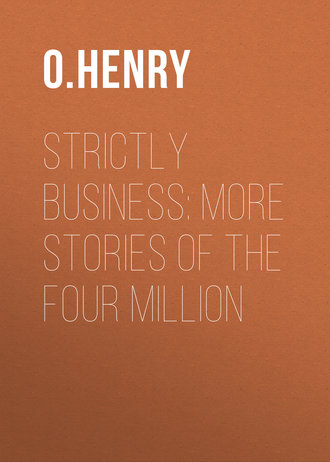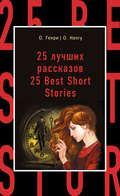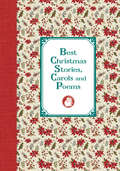
О. Генри
Strictly Business: More Stories of the Four Million
XVIII
THE GIRL AND THE HABIT
Habit – a tendency or aptitude acquired by custom or frequent repetition.
The critics have assailed every source of inspiration save one. To that one we are driven for our moral theme. When we levied upon the masters of old they gleefully dug up the parallels to our columns. When we strove to set forth real life they reproached us for trying to imitate Henry George, George Washington, Washington Irving, and Irving Bacheller. We wrote of the West and the East, and they accused us of both Jesse and Henry James. We wrote from our heart – and they said something about a disordered liver. We took a text from Matthew or – er – yes, Deuteronomy, but the preachers were hammering away at the inspiration idea before we could get into type. So, driven to the wall, we go for our subject-matter to the reliable, old, moral, unassailable vade mecum – the unabridged dictionary.
Miss Merriam was cashier at Hinkle's. Hinkle's is one of the big downtown restaurants. It is in what the papers call the "financial district." Each day from 12 o'clock to 2 Hinkle's was full of hungry customers – messenger boys, stenographers, brokers, owners of mining stock, promoters, inventors with patents pending – and also people with money.
The cashiership at Hinkle's was no sinecure. Hinkle egged and toasted and griddle-caked and coffeed a good many customers; and he lunched (as good a word as "dined") many more. It might be said that Hinkle's breakfast crowd was a contingent, but his luncheon patronage amounted to a horde.
Miss Merriam sat on a stool at a desk inclosed on three sides by a strong, high fencing of woven brass wire. Through an arched opening at the bottom you thrust your waiter's check and the money, while your heart went pit-a-pat.
For Miss Merriam was lovely and capable. She could take 45 cents out of a $2 bill and refuse an offer of marriage before you could – Next! – lost your chance – please don't shove. She could keep cool and collected while she collected your check, give you the correct change, win your heart, indicate the toothpick stand, and rate you to a quarter of a cent better than Bradstreet could to a thousand in less time than it takes to pepper an egg with one of Hinkle's casters.
There is an old and dignified allusion to the "fierce light that beats upon a throne." The light that beats upon the young lady cashier's cage is also something fierce. The other fellow is responsible for the slang.
Every male patron of Hinkle's, from the A. D. T. boys up to the curbstone brokers, adored Miss Merriam. When they paid their checks they wooed her with every wile known to Cupid's art. Between the meshes of the brass railing went smiles, winks, compliments, tender vows, invitations to dinner, sighs, languishing looks and merry banter that was wafted pointedly back by the gifted Miss Merriam.
There is no coign of vantage more effective than the position of young lady cashier. She sits there, easily queen of the court of commerce; she is duchess of dollars and devoirs, countess of compliments and coin, leading lady of love and luncheon. You take from her a smile and a Canadian dime, and you go your way uncomplaining. You count the cheery word or two that she tosses you as misers count their treasures; and you pocket the change for a five uncomputed. Perhaps the brass-bound inaccessibility multiplies her charms – anyhow, she is a shirt-waisted angel, immaculate, trim, manicured, seductive, bright-eyed, ready, alert – Psyche, Circe, and Ate in one, separating you from your circulating medium after your sirloin medium.
The young men who broke bread at Hinkle's never settled with the cashier without an exchange of badinage and open compliment. Many of them went to greater lengths and dropped promissory hints of theatre tickets and chocolates. The older men spoke plainly of orange blossoms, generally withering the tentative petals by after-allusions to Harlem flats. One broker, who had been squeezed by copper proposed to Miss Merriam more regularly than he ate.
During a brisk luncheon hour Miss Merriam's conversation, while she took money for checks, would run something like this:
"Good morning, Mr. Haskins – sir? – it's natural, thank you – don't be quite so fresh.. Hello, Johnny – ten, fifteen, twenty – chase along now or they'll take the letters off your cap.. Beg pardon – count it again, please – Oh, don't mention it.. Vaudeville? – thanks; not on your moving picture – I was to see Carter in Hedda Gabler on Wednesday night with Mr. Simmons.. 'Scuse me, I thought that was a quarter.. Twenty-five and seventy-five's a dollar – got that ham-and-cabbage habit yet. I see, Billy.. Who are you addressing? – say – you'll get all that's coming to you in a minute.. Oh, fudge! Mr. Bassett – you're always fooling – no – ? Well, maybe I'll marry you some day – three, four and sixty-five is five.. Kindly keep them remarks to yourself, if you please.. Ten cents? – 'scuse me; the check calls for seventy – well, maybe it is a one instead of a seven.. Oh, do you like it that way, Mr. Saunders? – some prefer a pomp; but they say this Cleo de Merody does suit refined features.. and ten is fifty.. Hike along there, buddy; don't take this for a Coney Island ticket booth.. Huh? – why, Macy's – don't it fit nice? Oh, no, it isn't too cool – these light-weight fabrics is all the go this season.. Come again, please – that's the third time you've tried to – what? – forget it – that lead quarter is an old friend of mine.. Sixty-five? – must have had your salary raised, Mr. Wilson.. I seen you on Sixth Avenue Tuesday afternoon, Mr. De Forest – swell? – oh, my! – who is she?.. What's the matter with it? – why, it ain't money – what? – Columbian half? – well, this ain't South America.. Yes, I like the mixed best – Friday? – awfully sorry, but I take my jiu-jitsu lesson on Friday – Thursday, then.. Thanks – that's sixteen times I've been told that this morning – I guess I must be beautiful.. Cut that out, please – who do you think I am?.. Why, Mr. Westbrook – do you really think so? – the idea! – one – eighty and twenty's a dollar – thank you ever so much, but I don't ever go automobile riding with gentlemen – your aunt? – well, that's different – perhaps.. Please don't get fresh – your check was fifteen cents, I believe – kindly step aside and let.. Hello, Ben – coming around Thursday evening? – there's a gentleman going to send around a box of chocolates, and.. forty and sixty is a dollar, and one is two."
About the middle of one afternoon the dizzy goddess Vertigo – whose other name is Fortune – suddenly smote an old, wealthy and eccentric banker while he was walking past Hinkle's, on his way to a street car. A wealthy and eccentric banker who rides in street cars is – move up, please; there are others.
A Samaritan, a Pharisee, a man and a policeman who were first on the spot lifted Banker McRamsey and carried him into Hinkle's restaurant. When the aged but indestructible banker opened his eyes he saw a beautiful vision bending over him with a pitiful, tender smile, bathing his forehead with beef tea and chafing his hands with something frappé out of a chafing-dish. Mr. McRamsey sighed, lost a vest button, gazed with deep gratitude upon his fair preserveress, and then recovered consciousness.
To the Seaside Library all who are anticipating a romance! Banker McRamsey had an aged and respected wife, and his sentiments toward Miss Merriam were fatherly. He talked to her for half an hour with interest – not the kind that went with his talks during business hours. The next day he brought Mrs. McRamsey down to see her. The old couple were childless – they had only a married daughter living in Brooklyn.
To make a short story shorter, the beautiful cashier won the hearts of the good old couple. They came to Hinkle's again and again; they invited her to their old-fashioned but splendid home in one of the East Seventies. Miss Merriam's winning loveliness, her sweet frankness and impulsive heart took them by storm. They said a hundred times that Miss Merriam reminded them so much of their lost daughter. The Brooklyn matron, née Ramsey, had the figure of Buddha and a face like the ideal of an art photographer. Miss Merriam was a combination of curves, smiles, rose leaves, pearls, satin and hair-tonic posters. Enough of the fatuity of parents.
A month after the worthy couple became acquainted with Miss Merriam, she stood before Hinkle one afternoon and resigned her cashiership.
"They're going to adopt me," she told the bereft restaurateur. "They're funny old people, but regular dears. And the swell home they have got! Say, Hinkle, there isn't any use of talking – I'm on the à la carte to wear brown duds and goggles in a whiz wagon, or marry a duke at least. Still, I somehow hate to break out of the old cage. I've been cashiering so long I feel funny doing anything else. I'll miss joshing the fellows awfully when they line up to pay for the buckwheats and. But I can't let this chance slide. And they're awfully good, Hinkle; I know I'll have a swell time. You owe me nine-sixty-two and a half for the week. Cut out the half if it hurts you, Hinkle."
And they did. Miss Merriam became Miss Rosa McRamsey. And she graced the transition. Beauty is only skin-deep, but the nerves lie very near to the skin. Nerve – but just here will you oblige by perusing again the quotation with which this story begins?
The McRamseys poured out money like domestic champagne to polish their adopted one. Milliners, dancing masters and private tutors got it. Miss – er – McRamsey was grateful, loving, and tried to forget Hinkle's. To give ample credit to the adaptability of the American girl, Hinkle's did fade from her memory and speech most of the time.
Not every one will remember when the Earl of Hitesbury came to East Seventy– Street, America. He was only a fair-to-medium earl, without debts, and he created little excitement. But you will surely remember the evening when the Daughters of Benevolence held their bazaar in the W–f-A–a Hotel. For you were there, and you wrote a note to Fannie on the hotel paper, and mailed it, just to show her that – you did not? Very well; that was the evening the baby was sick, of course.
At the bazaar the McRamseys were prominent. Miss Mer – er – McRamsey was exquisitely beautiful. The Earl of Hitesbury had been very attentive to her since he dropped in to have a look at America. At the charity bazaar the affair was supposed to be going to be pulled off to a finish. An earl is as good as a duke. Better. His standing may be lower, but his outstanding accounts are also lower.
Our ex-young-lady-cashier was assigned to a booth. She was expected to sell worthless articles to nobs and snobs at exorbitant prices. The proceeds of the bazaar were to be used for giving the poor children of the slums a Christmas din–Say! did you ever wonder where they get the other 364?
Miss McRamsey – beautiful, palpitating, excited, charming, radiant – fluttered about in her booth. An imitation brass network, with a little arched opening, fenced her in.
Along came the Earl, assured, delicate, accurate, admiring – admiring greatly, and faced the open wicket.
"You look chawming, you know – 'pon my word you do – my deah," he said, beguilingly.
Miss McRamsey whirled around.
"Cut that joshing out," she said, coolly and briskly. "Who do you think you are talking to? Your check, please. Oh, Lordy! – "
Patrons of the bazaar became aware of a commotion and pressed around a certain booth. The Earl of Hitesbury stood near by pulling a pale blond and puzzled whisker.
"Miss McRamsey has fainted," some one explained.
XIX
PROOF OF THE PUDDING
Spring winked a vitreous optic at Editor Westbrook of the Minerva Magazine, and deflected him from his course. He had lunched in his favorite corner of a Broadway hotel, and was returning to his office when his feet became entangled in the lure of the vernal coquette. Which is by way of saying that he turned eastward in Twenty-sixth Street, safely forded the spring freshet of vehicles in Fifth Avenue, and meandered along the walks of budding Madison Square.
The lenient air and the settings of the little park almost formed a pastoral; the color motif was green – the presiding shade at the creation of man and vegetation.
The callow grass between the walks was the color of verdigris, a poisonous green, reminiscent of the horde of derelict humans that had breathed upon the soil during the summer and autumn. The bursting tree buds looked strangely familiar to those who had botanized among the garnishings of the fish course of a forty-cent dinner. The sky above was of that pale aquamarine tint that ballroom poets rhyme with "true" and "Sue" and "coo." The one natural and frank color visible was the ostensible green of the newly painted benches – a shade between the color of a pickled cucumber and that of a last year's fast-black cravenette raincoat. But, to the city-bred eye of Editor Westbrook, the landscape appeared a masterpiece.
And now, whether you are of those who rush in, or of the gentle concourse that fears to tread, you must follow in a brief invasion of the editor's mind.
Editor Westbrook's spirit was contented and serene. The April number of the Minerva had sold its entire edition before the tenth day of the month – a newsdealer in Keokuk had written that he could have sold fifty copies more if he had 'em. The owners of the magazine had raised his (the editor's) salary; he had just installed in his home a jewel of a recently imported cook who was afraid of policemen; and the morning papers had published in full a speech he had made at a publishers' banquet. Also there were echoing in his mind the jubilant notes of a splendid song that his charming young wife had sung to him before he left his up-town apartment that morning. She was taking enthusiastic interest in her music of late, practising early and diligently. When he had complimented her on the improvement in her voice she had fairly hugged him for joy at his praise. He felt, too, the benign, tonic medicament of the trained nurse, Spring, tripping softly adown the wards of the convalescent city.
While Editor Westbrook was sauntering between the rows of park benches (already filling with vagrants and the guardians of lawless childhood) he felt his sleeve grasped and held. Suspecting that he was about to be panhandled, he turned a cold and unprofitable face, and saw that his captor was – Dawe – Shackleford Dawe, dingy, almost ragged, the genteel scarcely visible in him through the deeper lines of the shabby.
While the editor is pulling himself out of his surprise, a flashlight biography of Dawe is offered.
He was a fiction writer, and one of Westbrook's old acquaintances. At one time they might have called each other old friends. Dawe had some money in those days, and lived in a decent apartment house near Westbrook's. The two families often went to theatres and dinners together. Mrs. Dawe and Mrs. Westbrook became "dearest" friends. Then one day a little tentacle of the octopus, just to amuse itself, ingurgitated Dawe's capital, and he moved to the Gramercy Park neighborhood where one, for a few groats per week, may sit upon one's trunk under eight-branched chandeliers and opposite Carrara marble mantels and watch the mice play upon the floor. Dawe thought to live by writing fiction. Now and then he sold a story. He submitted many to Westbrook. The Minerva printed one or two of them; the rest were returned. Westbrook sent a careful and conscientious personal letter with each rejected manuscript, pointing out in detail his reasons for considering it unavailable. Editor Westbrook had his own clear conception of what constituted good fiction. So had Dawe. Mrs. Dawe was mainly concerned about the constituents of the scanty dishes of food that she managed to scrape together. One day Dawe had been spouting to her about the excellencies of certain French writers. At dinner they sat down to a dish that a hungry schoolboy could have encompassed at a gulp. Dawe commented.
"It's Maupassant hash," said Mrs. Dawe. "It may not be art, but I do wish you would do a five-course Marion Crawford serial with an Ella Wheeler Wilcox sonnet for dessert. I'm hungry."
As far as this from success was Shackleford Dawe when he plucked Editor Westbrook's sleeve in Madison Square. That was the first time the editor had seen Dawe in several months.
"Why, Shack, is this you?" said Westbrook, somewhat awkwardly, for the form of his phrase seemed to touch upon the other's changed appearance.
"Sit down for a minute," said Dawe, tugging at his sleeve. "This is my office. I can't come to yours, looking as I do. Oh, sit down – you won't be disgraced. Those half-plucked birds on the other benches will take you for a swell porch-climber. They won't know you are only an editor."
"Smoke, Shack?" said Editor Westbrook, sinking cautiously upon the virulent green bench. He always yielded gracefully when he did yield.
Dawe snapped at the cigar as a kingfisher darts at a sunperch, or a girl pecks at a chocolate cream.
"I have just – " began the editor.
"Oh, I know; don't finish," said Dawe. "Give me a match. You have just ten minutes to spare. How did you manage to get past my office-boy and invade my sanctum? There he goes now, throwing his club at a dog that couldn't read the 'Keep off the Grass' signs."
"How goes the writing?" asked the editor. "Look at me," said Dawe, "for your answer. Now don't put on that embarrassed, friendly-but-honest look and ask me why I don't get a job as a wine agent or a cab driver. I'm in the fight to a finish. I know I can write good fiction and I'll force you fellows to admit it yet. I'll make you change the spelling of 'regrets' to 'c-h-e-q-u-e' before I'm done with you."
Editor Westbrook gazed through his nose-glasses with a sweetly sorrowful, omniscient, sympathetic, skeptical expression – the copyrighted expression of the editor beleagured by the unavailable contributor.
"Have you read the last story I sent you – 'The Alarum of the Soul'?" asked Dawe.
"Carefully. I hesitated over that story, Shack, really I did. It had some good points. I was writing you a letter to send with it when it goes back to you. I regret – "
"Never mind the regrets," said Dawe, grimly. "There's neither salve nor sting in 'em any more. What I want to know is why. Come now; out with the good points first."
"The story," said Westbrook, deliberately, after a suppressed sigh, "is written around an almost original plot. Characterization – the best you have done. Construction – almost as good, except for a few weak joints which might be strengthened by a few changes and touches. It was a good story, except – "
"I can write English, can't I?" interrupted Dawe.
"I have always told you," said the editor, "that you had a style."
"Then the trouble is – "
"Same old thing," said Editor Westbrook. "You work up to your climax like an artist. And then you turn yourself into a photographer. I don't know what form of obstinate madness possesses you, but that is what you do with everything that you write. No, I will retract the comparison with the photographer. Now and then photography, in spite of its impossible perspective, manages to record a fleeting glimpse of truth. But you spoil every dénouement by those flat, drab, obliterating strokes of your brush that I have so often complained of. If you would rise to the literary pinnacle of your dramatic senses, and paint them in the high colors that art requires, the postman would leave fewer bulky, self-addressed envelopes at your door."
"Oh, fiddles and footlights!" cried Dawe, derisively. "You've got that old sawmill drama kink in your brain yet. When the man with the black mustache kidnaps golden-haired Bessie you are bound to have the mother kneel and raise her hands in the spotlight and say: 'May high heaven witness that I will rest neither night nor day till the heartless villain that has stolen me child feels the weight of another's vengeance!'"
Editor Westbrook conceded a smile of impervious complacency.
"I think," said he, "that in real life the woman would express herself in those words or in very similar ones."
"Not in a six hundred nights' run anywhere but on the stage," said Dawe hotly. "I'll tell you what she'd say in real life. She'd say: 'What! Bessie led away by a strange man? Good Lord! It's one trouble after another! Get my other hat, I must hurry around to the police-station. Why wasn't somebody looking after her, I'd like to know? For God's sake, get out of my way or I'll never get ready. Not that hat – the brown one with the velvet bows. Bessie must have been crazy; she's usually shy of strangers. Is that too much powder? Lordy! How I'm upset!'
"That's the way she'd talk," continued Dawe. "People in real life don't fly into heroics and blank verse at emotional crises. They simply can't do it. If they talk at all on such occasions they draw from the same vocabulary that they use every day, and muddle up their words and ideas a little more, that's all."
"Shack," said Editor Westbrook impressively, "did you ever pick up the mangled and lifeless form of a child from under the fender of a street car, and carry it in your arms and lay it down before the distracted mother? Did you ever do that and listen to the words of grief and despair as they flowed spontaneously from her lips?"
"I never did," said Dawe. "Did you?"
"Well, no," said Editor Westbrook, with a slight frown. "But I can well imagine what she would say."
"So can I," said Dawe.
And now the fitting time had come for Editor Westbrook to play the oracle and silence his opinionated contributor. It was not for an unarrived fictionist to dictate words to be uttered by the heroes and heroines of the Minerva Magazine, contrary to the theories of the editor thereof.
"My dear Shack," said he, "if I know anything of life I know that every sudden, deep and tragic emotion in the human heart calls forth an apposite, concordant, conformable and proportionate expression of feeling. How much of this inevitable accord between expression and feeling should be attributed to nature, and how much to the influence of art, it would be difficult to say. The sublimely terrible roar of the lioness that has been deprived of her cubs is dramatically as far above her customary whine and purr as the kingly and transcendent utterances of Lear are above the level of his senile vaporings. But it is also true that all men and women have what may be called a sub-conscious dramatic sense that is awakened by a sufficiently deep and powerful emotion – a sense unconsciously acquired from literature and the stage that prompts them to express those emotions in language befitting their importance and histrionic value."
"And in the name of the seven sacred saddle-blankets of Sagittarius, where did the stage and literature get the stunt?" asked Dawe.
"From life," answered the editor, triumphantly.
The story writer rose from the bench and gesticulated eloquently but dumbly. He was beggared for words with which to formulate adequately his dissent.
On a bench nearby a frowzy loafer opened his red eyes and perceived that his moral support was due a downtrodden brother.
"Punch him one, Jack," he called hoarsely to Dawe. "W'at's he come makin' a noise like a penny arcade for amongst gen'lemen that comes in the square to set and think?"
Editor Westbrook looked at his watch with an affected show of leisure.
"Tell me," asked Dawe, with truculent anxiety, "what especial faults in 'The Alarum of the Soul' caused you to throw it down?"
"When Gabriel Murray," said Westbrook, "goes to his telephone and is told that his fiancée has been shot by a burglar, he says – I do not recall the exact words, but – "
"I do," said Dawe. "He says: 'Damn Central; she always cuts me off.' (And then to his friend) 'Say, Tommy, does a thirty-two bullet make a big hole? It's kind of hard luck, ain't it? Could you get me a drink from the sideboard, Tommy? No; straight; nothing on the side.'"
"And again," continued the editor, without pausing for argument, "when Berenice opens the letter from her husband informing her that he has fled with the manicure girl, her words are – let me see – "
"She says," interposed the author: "'Well, what do you think of that!'"
"Absurdly inappropriate words," said Westbrook, "presenting an anti-climax – plunging the story into hopeless bathos. Worse yet; they mirror life falsely. No human being ever uttered banal colloquialisms when confronted by sudden tragedy."
"Wrong," said Dawe, closing his unshaven jaws doggedly. "I say no man or woman ever spouts 'high-falutin' talk when they go up against a real climax. They talk naturally and a little worse."
The editor rose from the bench with his air of indulgence and inside information.
"Say, Westbrook," said Dawe, pinning him by the lapel, "would you have accepted 'The Alarum of the Soul' if you had believed that the actions and words of the characters were true to life in the parts of the story that we discussed?"
"It is very likely that I would, if I believed that way," said the editor. "But I have explained to you that I do not."
"If I could prove to you that I am right?"
"I'm sorry, Shack, but I'm afraid I haven't time to argue any further just now."
"I don't want to argue," said Dawe. "I want to demonstrate to you from life itself that my view is the correct one."
"How could you do that?" asked Westbrook, in a surprised tone.
"Listen," said the writer, seriously. "I have thought of a way. It is important to me that my theory of true-to-life fiction be recognized as correct by the magazines. I've fought for it for three years, and I'm down to my last dollar, with two months' rent due."
"I have applied the opposite of your theory," said the editor, "in selecting the fiction for the Minerva Magazine. The circulation has gone up from ninety thousand to – "
"Four hundred thousand," said Dawe. "Whereas it should have been boosted to a million."
"You said something to me just now about demonstrating your pet theory."
"I will. If you'll give me about half an hour of your time I'll prove to you that I am right. I'll prove it by Louise."
"Your wife!" exclaimed Westbrook. "How?"
"Well, not exactly by her, but with her," said Dawe. "Now, you know how devoted and loving Louise has always been. She thinks I'm the only genuine preparation on the market that bears the old doctor's signature. She's been fonder and more faithful than ever, since I've been cast for the neglected genius part."
"Indeed, she is a charming and admirable life companion," agreed the editor. "I remember what inseparable friends she and Mrs. Westbrook once were. We are both lucky chaps, Shack, to have such wives. You must bring Mrs. Dawe up some evening soon, and we'll have one of those informal chafing-dish suppers that we used to enjoy so much."
"Later," said Dawe. "When I get another shirt. And now I'll tell you my scheme. When I was about to leave home after breakfast – if you can call tea and oatmeal breakfast – Louise told me she was going to visit her aunt in Eighty-ninth Street. She said she would return at three o'clock. She is always on time to a minute. It is now – "
Dawe glanced toward the editor's watch pocket.
"Twenty-seven minutes to three," said Westbrook, scanning his time-piece.
"We have just enough time," said Dawe. "We will go to my flat at once. I will write a note, address it to her and leave it on the table where she will see it as she enters the door. You and I will be in the dining-room concealed by the portières. In that note I'll say that I have fled from her forever with an affinity who understands the needs of my artistic soul as she never did. When she reads it we will observe her actions and hear her words. Then we will know which theory is the correct one – yours or mine."
"Oh, never!" exclaimed the editor, shaking his head. "That would be inexcusably cruel. I could not consent to have Mrs. Dawe's feelings played upon in such a manner."
"Brace up," said the writer. "I guess I think as much of her as you do. It's for her benefit as well as mine. I've got to get a market for my stories in some way. It won't hurt Louise. She's healthy and sound. Her heart goes as strong as a ninety-eight-cent watch. It'll last for only a minute, and then I'll step out and explain to her. You really owe it to me to give me the chance, Westbrook."
Editor Westbrook at length yielded, though but half willingly. And in the half of him that consented lurked the vivisectionist that is in all of us. Let him who has not used the scalpel rise and stand in his place. Pity 'tis that there are not enough rabbits and guinea-pigs to go around.
The two experimenters in Art left the Square and hurried eastward and then to the south until they arrived in the Gramercy neighborhood. Within its high iron railings the little park had put on its smart coat of vernal green, and was admiring itself in its fountain mirror. Outside the railings the hollow square of crumbling houses, shells of a bygone gentry, leaned as if in ghostly gossip over the forgotten doings of the vanished quality. Sic transit gloria urbis.
A block or two north of the Park, Dawe steered the editor again eastward, then, after covering a short distance, into a lofty but narrow flathouse burdened with a floridly over-decorated façade. To the fifth story they toiled, and Dawe, panting, pushed his latch-key into the door of one of the front flats.
When the door opened Editor Westbrook saw, with feelings of pity, how meanly and meagerly the rooms were furnished.
"Get a chair, if you can find one," said Dawe, "while I hunt up pen and ink. Hello, what's this? Here's a note from Louise. She must have left it there when she went out this morning."
He picked up an envelope that lay on the centre-table and tore it open. He began to read the letter that he drew out of it; and once having begun it aloud he so read it through to the end. These are the words that Editor Westbrook heard:







